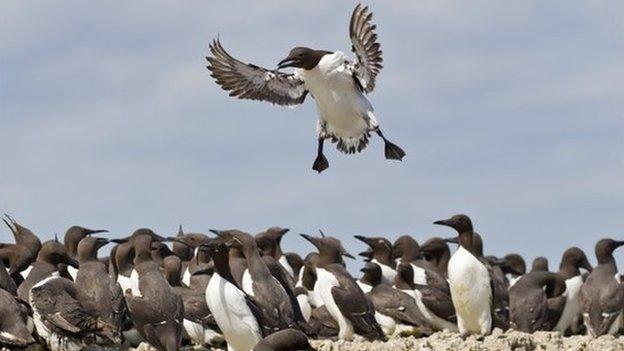Skomer and Skokholm volunteers' 'amazing encounters'
- Published
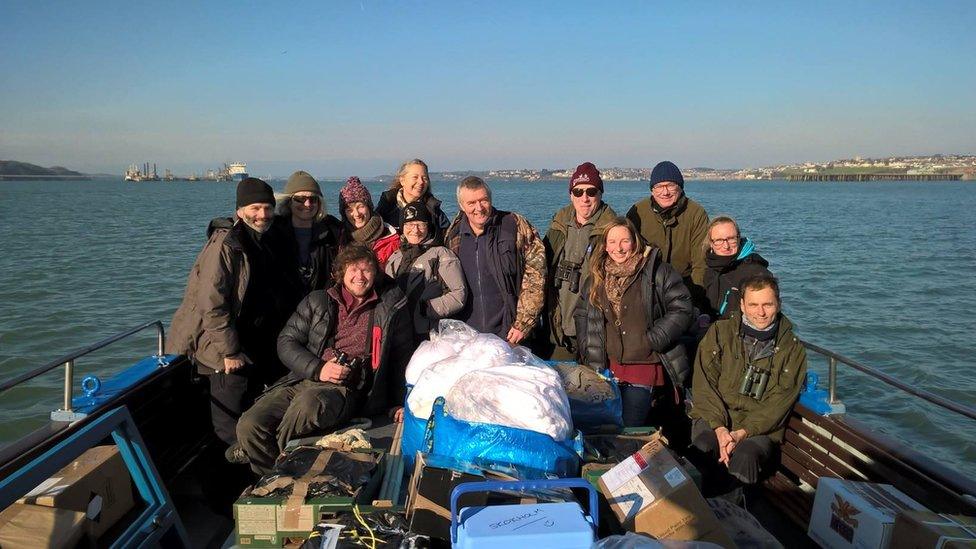
Wardens and volunteers heading back to Skokholm ahead of the visitor season
The Pembrokeshire islands of Skomer and Skokholm are world renowned for their seabird colonies, but less is known about the people who give up their time to help run them.
The sister islands lie a few miles off the county's west coast and are both National Nature Reserves managed by the Wildlife Trust of South and West Wales.
They are open to visitors between April and September, with Skomer offering day and overnight visits, and Skokholm just overnight visits.
The latest count showed there were more than 22,000 puffins, 23,000 guillemots and 7,000 razorbills on Skomer, and together with Skokholm, there are an estimated 316,000 breeding pairs of Manx shearwaters - half of the world's total population.
The islands are also home to seals, dolphins, porpoises, rabbits, voles and birds of prey such as buzzards, peregrine falcons and owls.
Puffins are Skomer's most famous residents
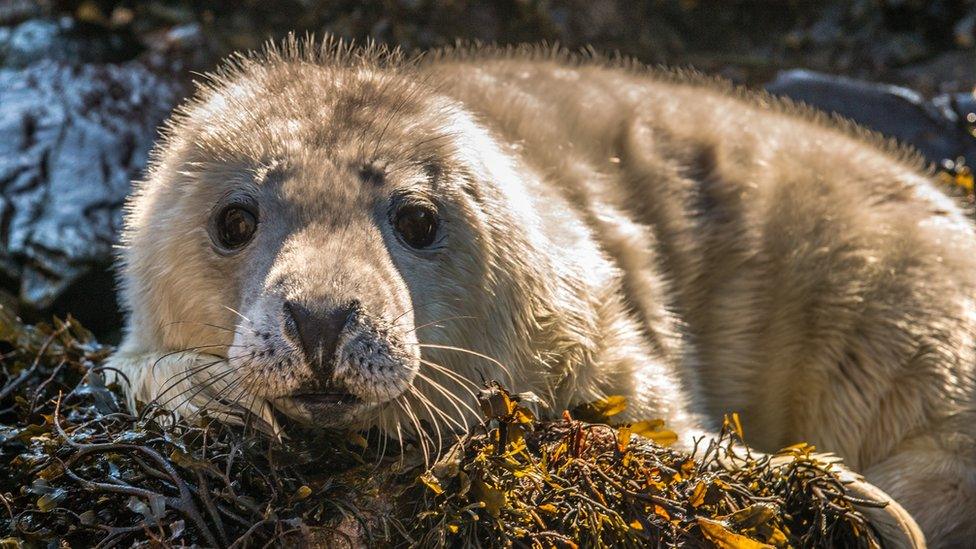
Skomer is one of the best places to see seal pups during September
The wildlife trust relies heavily on the work of volunteers to help manage the islands and monitor their wildlife.
It recruits about 150 weekly volunteers between April and October on Skomer. They work alongside four long-term volunteers who stay on the island for three months each.
There is a similar long term volunteering arrangement on Skokholm, and each year a work party of volunteers get the island ready for the visitor season.
Volunteer roles include seabird and seal monitoring, welcoming guests, giving talks, cleaning the visitor accommodation and general maintenance projects.
Some volunteers use the time to carry out their own research projects and write blogs. , external
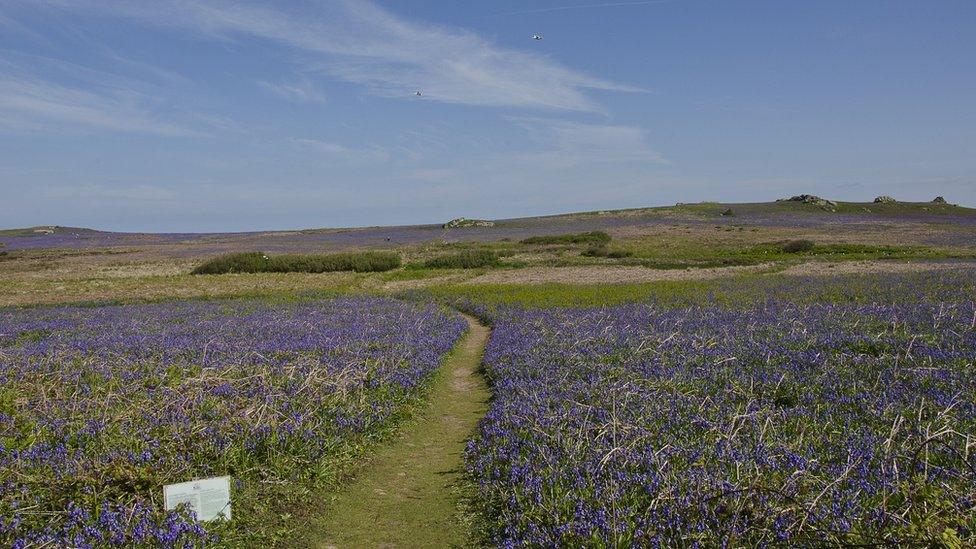
Bluebells on Skomer Island
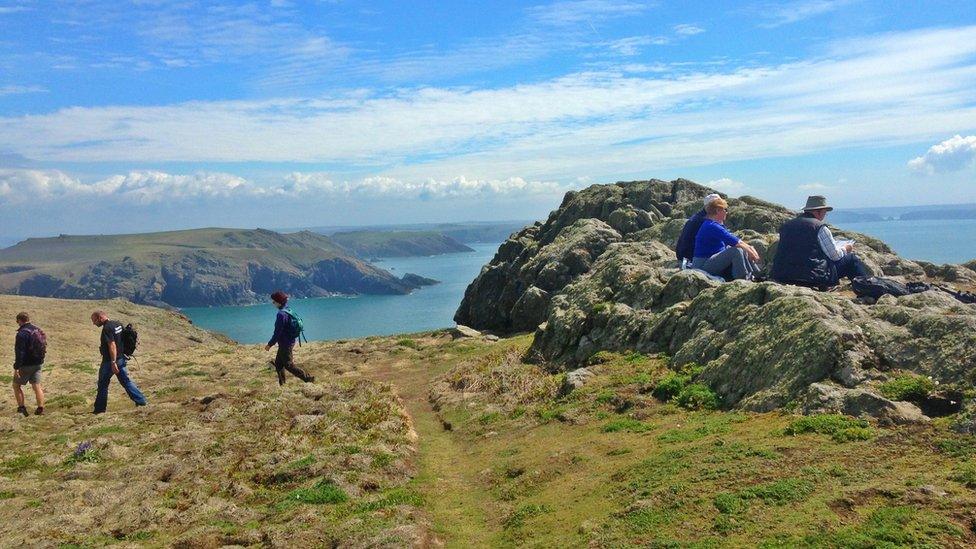
There is a limit of 250 visitors per day on Skomer to protect the wildlife
Steve and Anna Sutcliffe first volunteered on Skokholm Island in 1979 and continue to be involved today.
Mr Sutcliffe, originally from Tenby, was a warden on Skomer from 1986 to 1994 and a director for the Princes Trust in Pembrokeshire before retiring six years ago.
Mrs Sutcliffe first came to Pembrokeshire from London in 1976 to teach in Dale Fort Field Centre and has stayed ever since.
She is a full-time ecologist and has led wildlife tours all over the world, including in the Antarctic.
The couple have organised a work party of volunteers on Skokholm since 2010 and they have been instrumental in re-opening the island to the public and reinstating its bird observatory status.
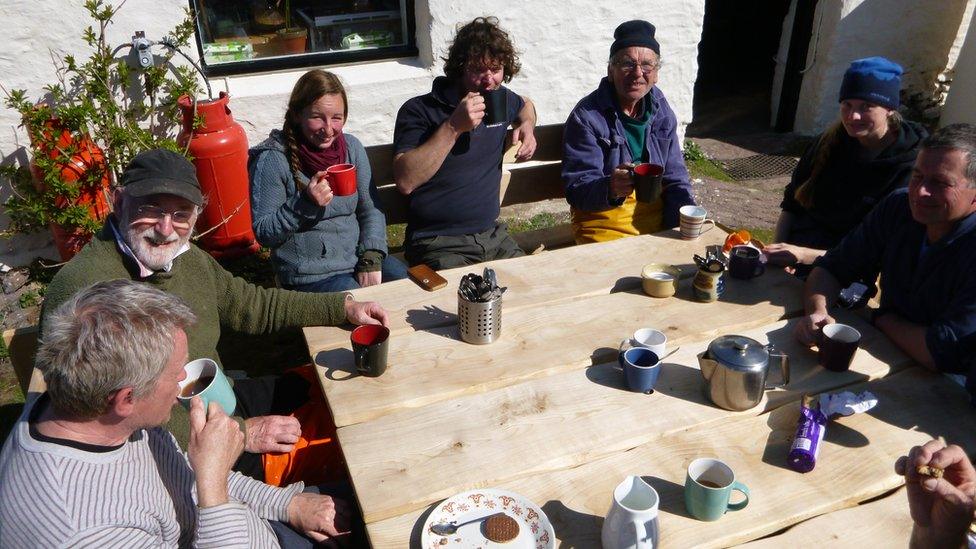
Skokholm volunteers enjoying a well earned tea break
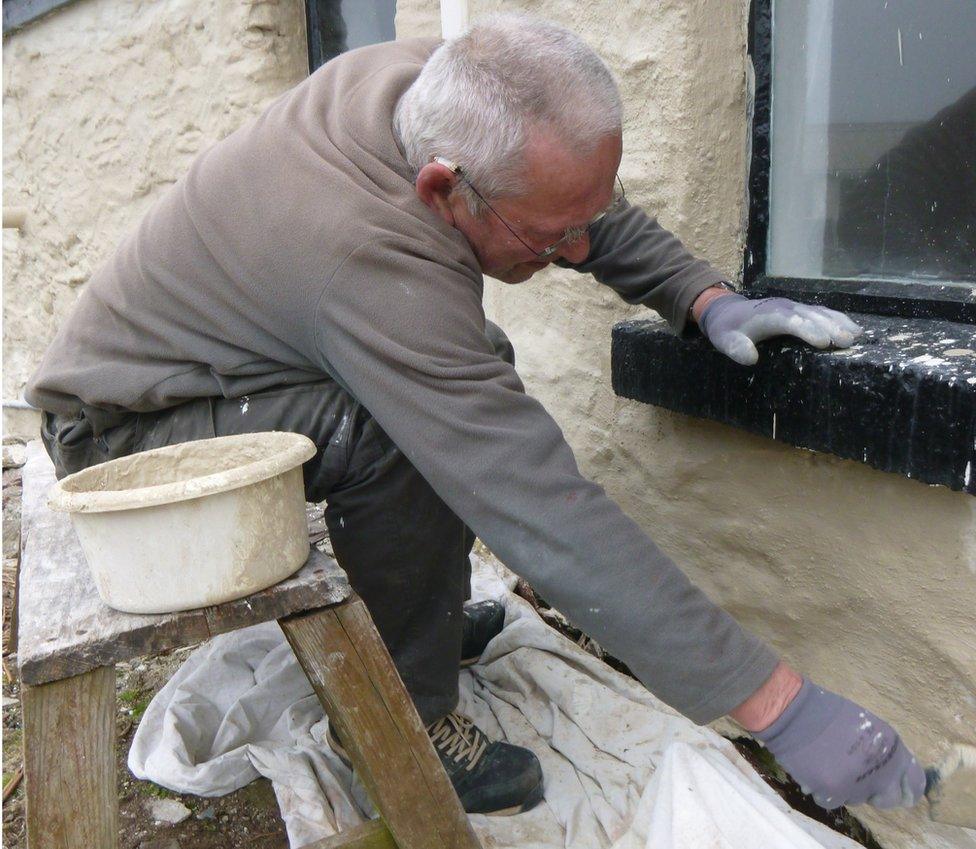
A Skokholm volunteer lime washing the buildings – an annual job which keeps them in good condition
Mr Sutcliffe said the island "had been left to rot" and it needed a huge amount of work over the last few years.
He and Mrs Sutcliffe are currently on the island with a group of volunteers.
Asked what Skokholm meant to him, Mr Sutcliffe said: "Because it's fairly small (240 acres) it is easy to get to know.
"It's an attractive place and has some great wildlife.
"It offers us chances to do things most people don't get the opportunity to do.
"It also continues to cement our island passions - we have been to a lot of small islands."
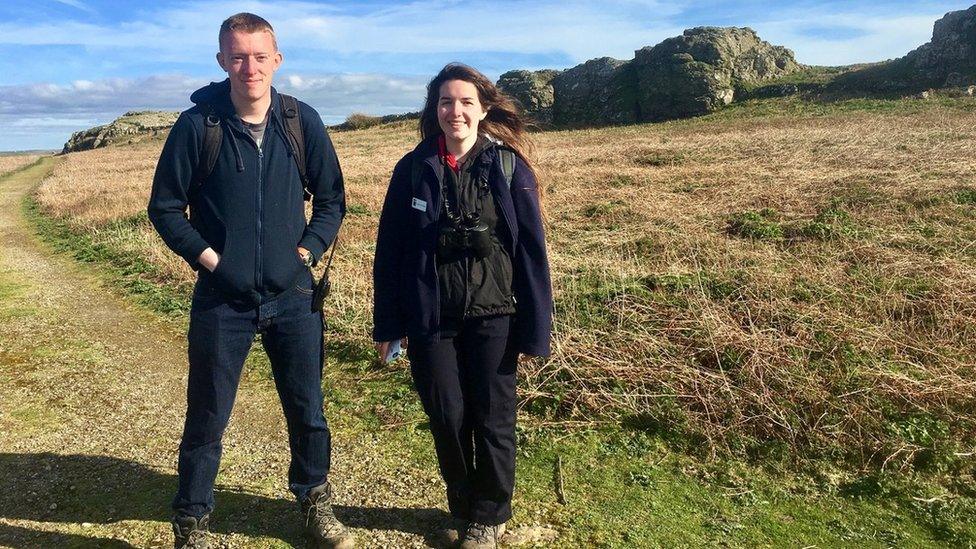
Thomas Faulkner and Ruby Temple-Long are staying on Skomer for three months
Thomas Faulkner, 23, and Ruby Temple-Long, 21 are both long term volunteers on Skomer.
Mr Faulkner is an ecology graduate and has been involved with various conservation organisations for more than 10 years. He volunteered on the island for a week last year and was eager for an opportunity to stay longer.
"There hasn't been a time I can remember when I wasn't fascinated by the natural world," he said.
When volunteers first arrive on the island they have to bring a month's supply of food in case they get stranded, and they do a monthly supermarket delivery order.
"Fresh food runs out quickly, so we mainly survive on tins, dried and some frozen food," explained Mr Faulkner.
"The island is managed sustainably which means electricity and water resources are limited. There is no central heating which makes the nights a bit chilly but otherwise it is very comfortable."
He said daily showers and an inability to "pop to the shops" were the things he missed the most about home, while his favourite thing was "getting to know a patch of land and its wildlife intimately".
"As soon as a bird lands on the island it has probably already been jotted down in someone's notebook."
Mr Faulkner said island living had given him a "very localised perspective".
"You often forget the mainland exists. I've found myself out of touch of social media and the news."
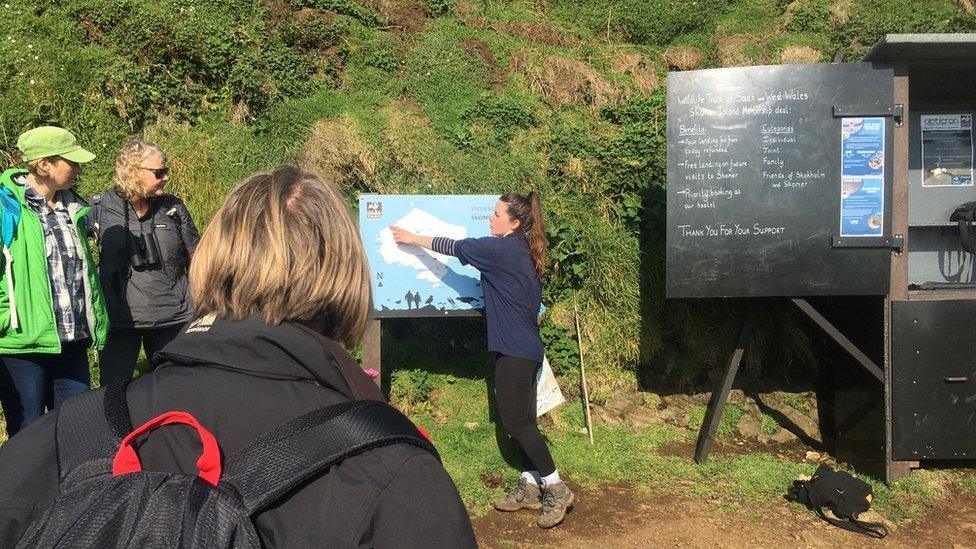
Ms Temple-Long gives a talk to visitors on Skomer
Ms Temple-Long is a marine biology graduate and a first time volunteer. Before arriving on Skomer she worked full-time in an office and wanted to get away from her desk.
She said she was attracted to Skomer by the "vast array of species" and research opportunities.
"The best thing is the amazing wildlife encounters that happen every day. No two days are the same," she said.
"Having the chance to share your passions and knowledge with the day trippers is also great. Everyone that comes here is always so excited. It makes you happy being able to share some tips on what to look out for as it often fuels their enthusiasm."
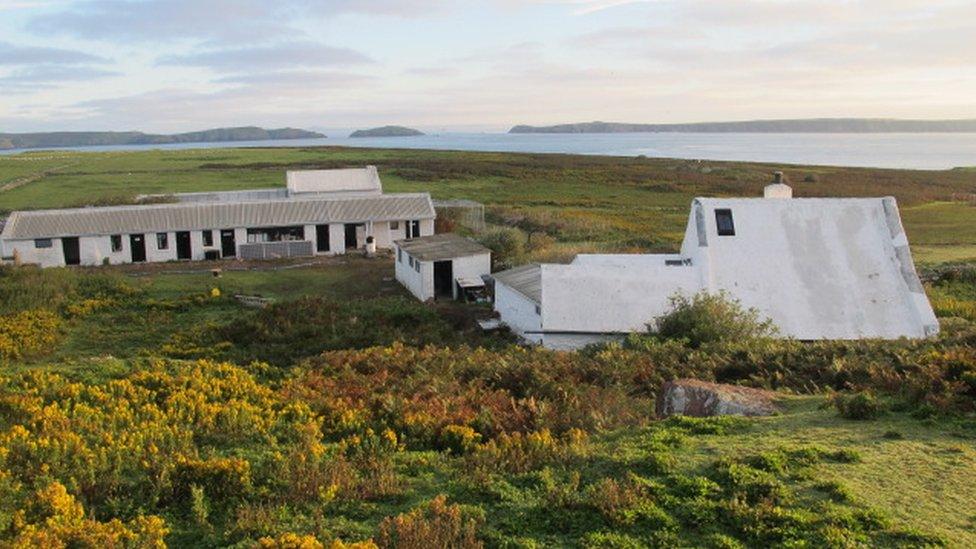
Skokholm Island accommodation
Ms Temple-Long said there was not much time to miss home as there is always a lot to see and do.
"The only thing I would have to say I miss would be not having to restrict bathing. As the island is managed sustainably we have a limited water supply so it's not feasible for everyone to shower as much as they'd like to.
"It just reminds me a lot of camping."
She added the volunteering opportunity has "reinforced her belief to do things that you are interested in".
"The difference you feel when the tasks you are completing feel like they have a purpose and that you learn from is so much more valuable than sticking to something because it's easier," she said.
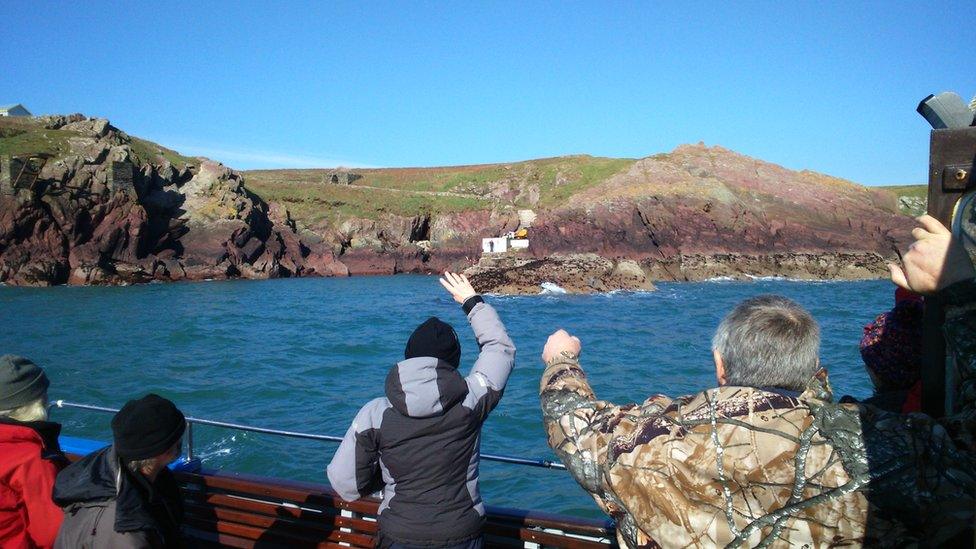
- Published12 December 2014
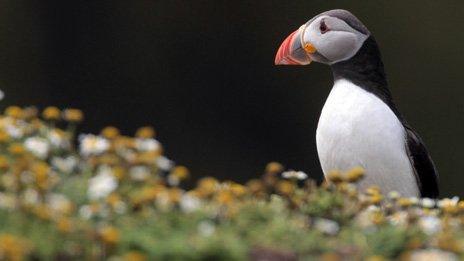
- Published2 October 2014
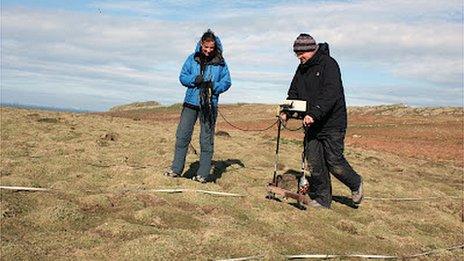
- Published4 July 2014
